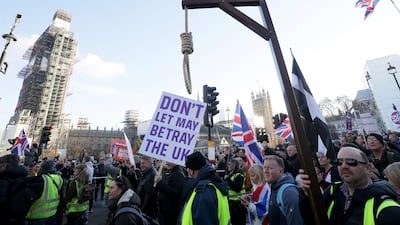The UK government has announced that it will soon send out a 100-page information pack for businesses on preparing for a no-deal Brexit. What was once touted as the easiest trade deal in history has proven anything but, and the nation now faces the very real risk of crashing out of the EU with no safety net. Tellingly, at the end of last year, the words "in the unlikely event" were quietly removed from the official Gov.uk website.
Reports of government contingencies have included the minister for health buying fridges to stockpile medicines and a plan for 3,500 troops to be put on standby to deal with any disruption caused by such a scenario. In other words, regardless of whether people voted to leave or remain, they need to start putting safeguards in place.
Households across Britain will soon be sent similar information packs. Unsurprisingly, none of the government’s many official notices mention anything about Muslims, people of colour or other minorities making special preparations – but should they? The idea is not as alarmist as it might seem.
Since the 2016 decision to leave the EU, public discourse about minorities and how it is acceptable to talk about them and treat them has changed. This can be seen across the media and in steadily rising reports of hate crimes. Now, it is looking like achieving Brexit and "taking back control" will cost everyday British people dearly, which has the potential to create an even more inhospitable environment for minorities.
In the UK, Muslims have become scapegoats for the failures of a nation. They are dehumanised and referred to as a threat, over and over, by voices that enjoy prominent platforms. Ironically, while much of the rhetoric that led to Brexit was based around the idea of keeping migrants out of the UK, the right wing has no problems with importing its ideas from overseas.
A pernicious feedback loop between the UK, mainland Europe and the US is at play. As ludicrous as it is, the idea that the goal of mainstream European and American Muslims is to take over and replace democracy with sharia has plenty of currency, from the darkest reaches of the internet to broadcast networks and national newspapers.
There are plenty of distressing examples of inflammatory rhetoric against minorities eventually turning into brutal violence. Just look at what happened Rwanda, Burundi, Kosovo and Bosnia. These may seem like extreme examples, but they are not. Separatism and nationalism never lead anywhere good. Today’s white supremacist talking points, which are being increasingly legitimised and absorbed into acceptable political discourse, all come from a similar place of intolerance.
Across British society, tacit permission has been granted for the expression of divisive and reactionary views. Checks on prejudice that were once widely upheld have been gradually dismantled. Now, it is common to hear people mocking others for being “snowflakes”. Political correctness is referred to as having “gone mad”.
Throughout Europe, right-wing populist parties are gaining power and momentum by peddling the same ideas. These countries are not far off lands. Nowhere is any more. In an increasingly connected world, dangerous ideas can be passed on rapidly, making the spread of hatred and division clear and present.
Of course, there is the possibility that, should the UK endure the inevitable economic difficulties of a hard Brexit, people will realise that migrants and minority groups are not the cause of the country’s problems. People of all races and religions could, as a result, come together to fix the deep and systemic problems of inequality and lack of opportunity that have plagued the nation for decades. However, creating the level of understanding necessary for that level of co-operation takes a great deal of work – work that needs to begin without delay.
Now more than ever, minorities of all backgrounds and their allies should be vocal about their concerns and the government must ensure that robust protections are in place for everyone. Whatever happens with Brexit, we will all be in it together. However, ideas of solidarity, equality and inclusivity won't arrive in a lightbulb moment. They need to be seeded, nurtured and supported at every level. This must start now, because the alternative is unspeakable.
Shelina Janmohamed is the author of Love in a Headscarf and Generation M: Young Muslims Changing the World


